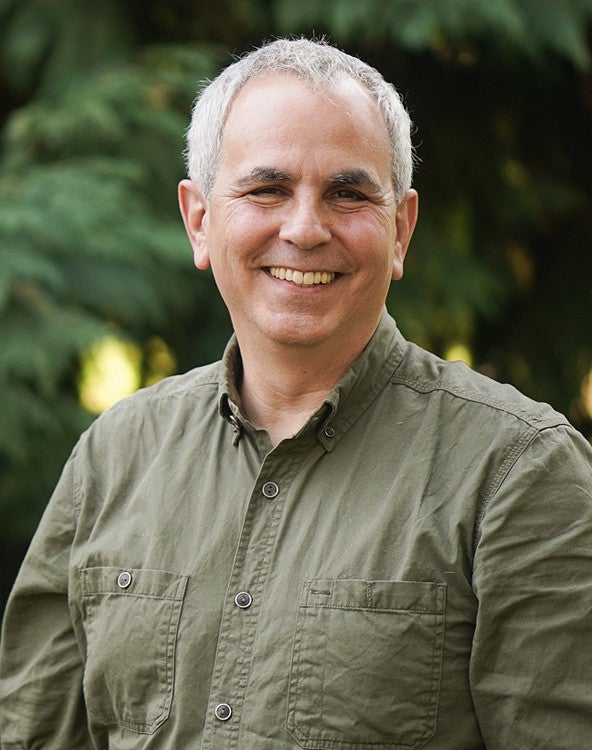
Hometown: Rochester, New York
Primary Research Interests: Documentary storytelling, photojournalism, daily news
Favorite Quote: “Don't tell me the moon is shining; show me the glint of light on broken glass.” – Attributed to Anton Checkhov
Say “hello!”: Follow him on Instagram @wyurman
You’ve heard it a million times — “a photo is worth 1,000 words.” For recently hired UO School of Journalism and Communication (SOJC) instructor Will Yurman, this is not an exaggeration. With a focus on photojournalism and visual storytelling, Yurman can tell an entire story with a still photograph.
His love for photography evolved when he joined a group of student photographers for the school newspaper and yearbook at the University at Albany. Yurman’s extensive background in photojournalism began with work as a photographer’s assistant in Albany right out of college, and grew to include freelance work for the Associated Press (AP). His work has since taken him around the world, including Alaska, New York and the Middle East, where he covered the Israeli-Palestinian conflict.
But, according to Yurman, his most meaningful project was centered on his hometown. He documented the lives of every 2007 homicide victim in Rochester, New York, in a project titled “Not Forgotten.” He spent the year visiting candlelight vigils, attending funerals and talking to the people close to the victims. Yurman’s focus wasn’t on the crime itself, but on the story of the victim’s life.
He joined the SOJC from Penn State’s Department of Journalism, where he began in 2011 as a senior lecturer and ended as an associate teaching professor. His skills include documentary filmmaking, still photography, writing, editing, web design and 360-degree augmented reality video.
We got the opportunity to sit down and talk about how he will use his skills at the SOJC.
When did you become interested in photography?
I received a biology degree in college and had planned to pursue veterinary school, but by my junior year, I realized that wasn’t going to happen. At the same time, my love for photography was growing, and I became immersed in my experience with the photo group on campus. I fell in love with photography through spending time with other students. It’s why I think my student’s experiences out of class are so important — because mine was life-changing. Then my time as a freelance photojournalist for AP really captured me.
Why is visual storytelling important?
It’s as informational to see what something looks like as it is to know the facts. The sound of someone’s voice is what connects us, which is why I am drawn to both audio and photography. Images and sounds are powerful because it does something that the written word often can’t accomplish alone.
How will your interests be a part of your teaching?
Talking about my personal and professional experiences is important to my teaching. I have a long career in journalism, which applies to all of the classes I teach — from reporting to multimedia. I thrive when I can share my newsroom experiences with students who haven’t gotten to experience them yet.
What do you hope your students walk away with?
I hope that my students discover for themselves what they are passionate about. It’s important to learn if you don’t want to be a journalist as much as to learn that you do. So I hope that they learn what the power and potential of journalism can be. Even if they don’t become journalists, I hope that they develop a better understanding of how they, as members of society, think about and consume journalism.
Why did you decide to come to the SOJC?
I knew that I wanted to come out to the West Coast, but I was particularly impressed by the work ethic and warmth of the faculty in the SOJC. They have a real commitment to teaching and place what’s best for students at the center of their decisions. That’s how I think about teaching, so an instructor position at the SOJC was really appealing to me.
What do you hope to accomplish at the SOJC?
I want to collaborate with other faculty and work together to provide students with a richer educational experience. I find that the best experiences for students emerge when their assignments feel as close to real life as possible, and I hope to emulate a real-world journalism environment for students.
What do you like to do in your free time?
I have been working on a photo-a-day project where I capture a photo every day and post it on my website. I haven’t missed a day in 19 years. I like to consume media, from well-written storytelling and nonfiction books to Marvel movies and independent films. I also like to cook and hike. I live in Florence, which is the start of the Oregon Dunes National Recreation Area, and I like to explore over there.
–By Whitney Conaghan, class of ’23
Whitney Conaghan, class of ’23, is a public relations major and multimedia minor. She is currently working as a social media and writing intern for the SOJC’s Communication Team.
